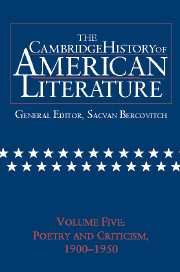Epilogue
from 5 - Ezra Pound
Published online by Cambridge University Press: 28 March 2008
Summary
G. H. Boker, Thomas Bailey Aldrich, Bayard Taylor, E. C. Stredman, R. H. Stoddard, Richard Watson Gilder – names which now mean nothing, not even to the diligent reader of poems. But to many appreciative American readers at the end of the nineteenth century, these names were synonymous with poetry. Other readers – Eliot, Frost, and especially Pound among them – saw things differently, saw these displaced late Victorians, this genteel cabal, filling the day's major magazines of culture, saw these fat old hens styling themselves as wise old owls and taking roost in the impossibly successful anthologies of Palgrave and Rittenhouse; from there, and from deep inside cultured American's heart, they saw these men squatting out the inadequate eggs of the day, their boring poems.
Against this intolerable situation, the modernists made their attack. When the feathers finally settled, a handful of expatriates and the scattered nativist and homebody had already proved that the young century might be an American century, for poetry at least. Of course, the new movement was international in scope, its contributions coming from the artists of various lands. But who a few years before the explosion would have been perceptive or bold enough to predict the American abundance of Eliot, Stevens, Pound, of Frost and Moore and Crane and Hughes and William Carlos Williams?
So the day was won by this historical movement, this modernism. And what of its particular aesthetic successes, its lasting objects of art, its major poems? R. P. Blackmur weighed in fifty years ago with a partial assessment that would still garner partial assent from a wide range of critical judges: “It is a striking and disheartening fact that the three most ambitious poems of our time should all have failed in similar ways: in composition, in independent objective existence, and in intelligibility of language.”
- Type
- Chapter
- Information
- The Cambridge History of American Literature , pp. 174 - 178Publisher: Cambridge University PressPrint publication year: 2003

